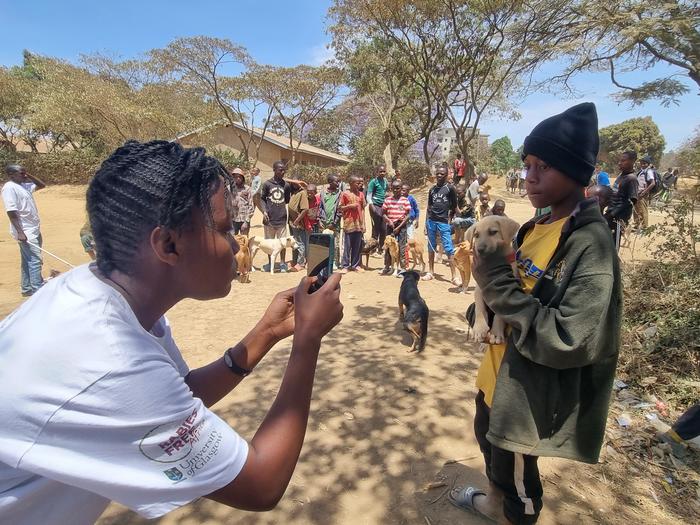A new mobile phone-based facial recognition application for dogs has the potential to significantly improve rabies vaccination efforts in endemic areas like Africa and Asia, according to a study on the research published in the journal Scientific Reports.

Credit: WSU College of Veterinary Medicine
A new mobile phone-based facial recognition application for dogs has the potential to significantly improve rabies vaccination efforts in endemic areas like Africa and Asia, according to a study on the research published in the journal Scientific Reports.
Led by researchers at Washington State University, a team used the app to test its effectiveness at a rabies vaccination clinic in rural Tanzania where they microchipped, vaccinated and registered dogs. The technology proved remarkably accurate during a subsequent visit to surrounding villages once poor images and improperly recorded information were removed from its database. Using the app, operators identified 76.2% of vaccinated dogs and 98.9% of unvaccinated dogs.
“Because domestic dogs are the main reservoir for human rabies, controlling human rabies globally requires the mass vaccination of dogs,” WSU Associate Professor Felix Lankester, the principal investigator of the study, said. “When carrying out mass vaccination, one of the major problems that we face is trying to identify which dogs have and haven’t been vaccinated. For example, microchips are too expensive to use at the scales needed to eliminate rabies, and collars can be removed by owners. We developed this app to see if facial recognition might work, and it’s showing great promise in helping us to achieve that goal.”
Rabies kills an estimated 60,000 people annually. Nearly all cases occur in Africa and Asia, and more than 99% are the result of dog bites. Systematic and consistent vaccination efforts, like those led by WSU’s Rabies Free Africa program, are effective at controlling the disease, but approximately 40% of dogs in an area must be vaccinated at any one time to achieve herd immunity and prevent sustained virus transmission. This makes the ability to accurately and efficiently identify vaccinated dogs vital for successful rabies elimination programs.
The facial recognition algorithm used within the application, developed in collaboration with PiP My Pet, a company located in Vancouver, Canada, and researchers in WSU’s Paul G. Allen School for Global Health, identifies a dog by examining key components of its face and comparing it to images of the faces of other dogs in its archive of previously stored images. Images with the highest number of similar components are returned as possible matches, and the user must decide if there is a match.
The app depends on image quality and information about each dog, including its age, color and sex, being properly recorded. Before poor quality images and incorrect information were removed from the database, users were only able to match 65% of the vaccinated dogs.
Lankester, who also serves as a director of Rabies Free Africa, said the app’s effectiveness could be improved with better technology – like newer smartphones with high-quality cameras – and additional operator training.
In addition to its potential as a tool in identifying vaccinated dogs, the technology holds promise for use in other species, disease control efforts and research purposes where animals might need to be identified.
Currently, users must be online to operate the facial matching component, however, Lankester said the team is also working to compress the size of the “engine” that drives the app’s matching facility to allow it to be downloaded and used offline, which would reduce the app’s reliance on internet access, which is not always available in more remote areas.
“We’re not quite there yet, but I think with investment, the technology can get there. I’m excited by its potential,” Lankester said, “but we have to find some funding to invest in pushing it forward. I welcome people to get in touch if they have funding ideas or would like to collaborate on this.”
Journal
Scientific Reports
DOI
10.1038/s41598-023-49522-2
Article Title
Testing novel facial recognition technology to identify dogs during vaccination campaigns
Article Publication Date
12-Dec-2023




